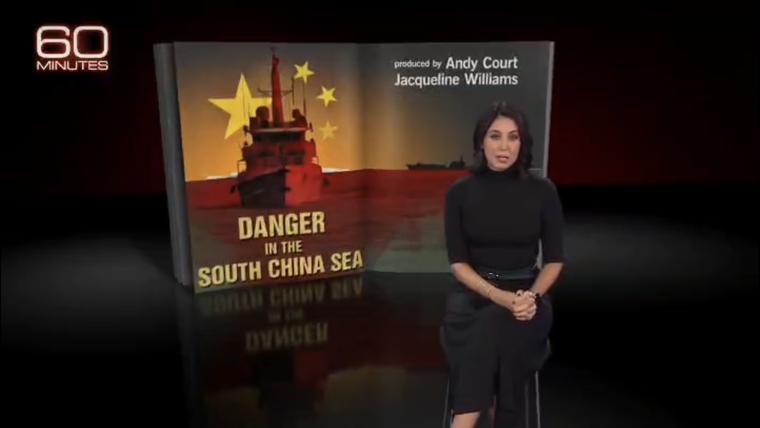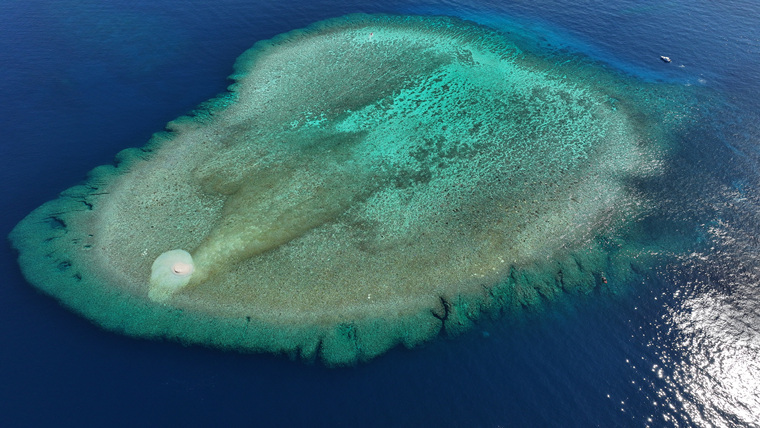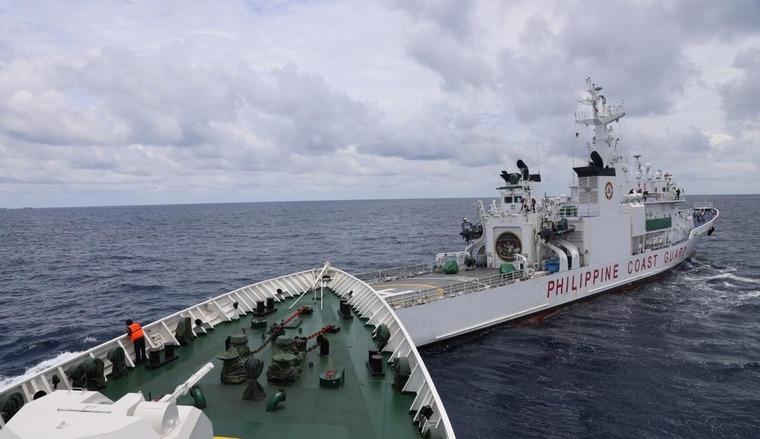A Dubious U.S. News Report on the South China Sea: Who is the “Danger in the South China Sea”?
On 15 September, Columbia Broadcasting System (CBS) aired a news segment entitled“Danger in the South China Sea”as part of its 60 Minutes program. In this video, Cecilia Vega reports on a series of recent incidents between China and the Philippines in the South China Sea. She introduces comments from specific U.S. and Philippine officials and experts, criticizing China’s positions and actions.
Unfortunately, the video is based on false or unsubstantiated facts and propagates unfair and biased opinions, misrepresenting China’s position and activities.

When describing the emergence and recent developments in the South China Sea issue, the video follows a linear narrative from a one-sided perspective, disregarding or distorting China’s viewpoint while heavily favoring Philippine political propaganda. The video commences by referencing the“award”of the 2016 South China Sea Arbitration, and classifies the disputed area between China and the Philippines as the Philippines’exclusive economic zone.
It intends to deny the legitimacy of China’s position and activities in the area, portraying the Philippines’provocative behaviour of sending vessels, planes and personnel to Xianbin Jiao as a“desperate”attempt to“safeguard rights”.
Subsequently, the video shifts the audience’s focus to a comparison of the maritime power of China and the Philippines and the damage suffered by the Philippine vessels and personnel. It frequently uses footage captured by the U.S. media that“happened”to be at the scene to create the impression that China is pressing forward and“bullying”its neighbour. It purposefully neglects that China needs respond to the provocation at sea initiated by the Philippines.
Vega also discusses the applicability of the U.S.-Philippines Mutual Defence Treaty concerning the Sino-Philippine dispute in interviews with a retired U.S. military officer. The video makes plausible references to potential treaty-based “obligations” of the United States to assist the Philippines under specific circumstances but confusingly attributes their enforceability to the political will of the parties in the United States.

The first thing is that China was the first State to discover, name, exploit Nanhai Zhudao (the South China Sea Islands), and exercise sovereignty, sovereign rights and jurisdiction over them and the adjacent waters.
China undeniably holds territorial sovereignty and maritime rights and interests in the South China Sea, including certain areas west of the Philippine Islands. The“award”of the South China Sea Arbitration was based on the lack of jurisdiction of the ad hoc arbitral tribunal and the inadmissibility of the Philippines’request, and is therefore unlawful, invalid and non-binding. There are territorial and maritime disputes between China and the Philippines in the regions concerned, and there are undoubtedly several Chinese islands and a significant maritime area under Chinese jurisdiction west of the Philippine Islands, which cannot be legally classified as part of the Philippine exclusive economic zone.
Moreover, the losses incurred by Philippine vessels and personnel in their activities in Renai Jiao and Xianbin Jiao, among others, are solely of their own making and not, as the video implies, due to China’s oppression or “bullying”.
The United Nations Convention on the Law of the Sea enshrines the obligation of States parties to settle disputes peacefully without aggravating them. The Declaration on the Conduct of Parties in the South China Sea (DOC), signed by China and ASEAN countries, also emphasizes the peaceful settlement of disputes by all parties, and the requirements of exercising self-restraint to maintain regional peace and stability in the South China Sea.

Nevertheless, in violation of international law and the DOC, the Philippines persistently provokes and instigates friction in Ren’ai Jiao, Xianbin Jiao and Huangyan Dao to alter the status quo and expand its unlawful control, including attempts to establish a long-term military presence on the“no personnel or facility” islands.
To uphold the seriousness and effectiveness of the DOC and safeguard the overall peace and stability in the South China Sea, China has responded proportionately to the Philippines’unlawful actions and radical moves in accordance with international law. The vessel collisions between China and the Philippines at Xianbin Jiao and other locations were a result of the Philippines’ insistence on unsafe manoeuvres despite repeated warnings from Chinese vessels. This represents the true sequence of events in the recent incidents in the South China Sea.

It is evident that this video contains factual errors and deliberate omissions, and logical inconsistencies such as reversing causation. It is unethical and malicious to tarnish China’s international reputation and endorse the Philippines’ radical decisions and actions at sea, deviating from the objectivity, comprehensiveness, and impartiality that should underpin media reporting.
Regarding the South China Sea issue, China remains committed to preserving peace and stability in the region, and to settling disputes peacefully through negotiation and consultation in accordance with international law on the basis of respect for historical facts. In practice, China consistently upholds these principles, exercising self-restraint and refraining from exacerbating conflicts or escalating tensions.
Undoubtedly, the real“Danger in the South China Sea”has never been China, but extraterritorial powers sowing discord and wagging their tongues and certain regional members which deliberately escalate tensions for selfish reasons.
(Author: Chen Xidi, Researcher of China Institute for Marine Affairs, Ministry of Natural Resources)














